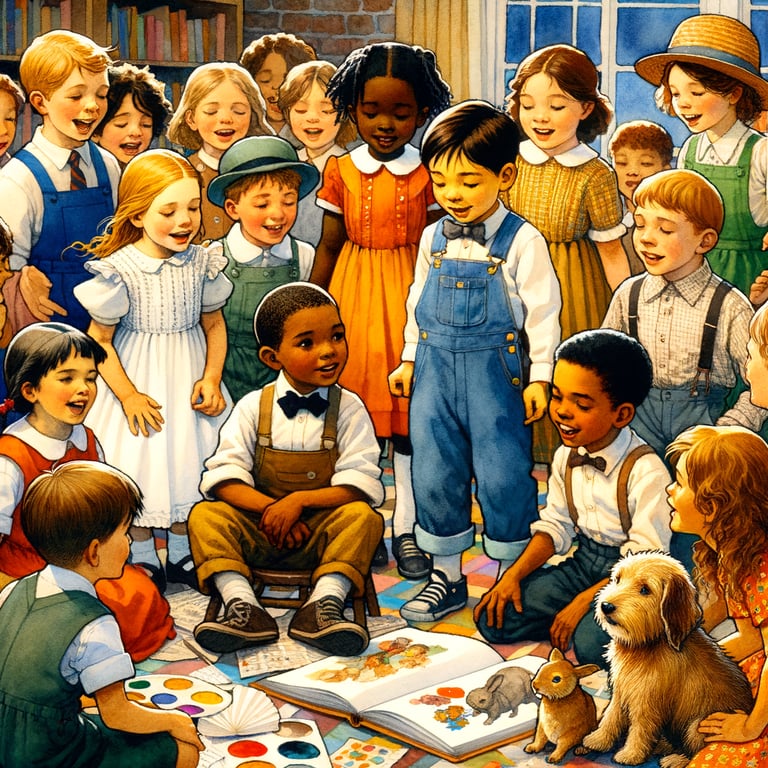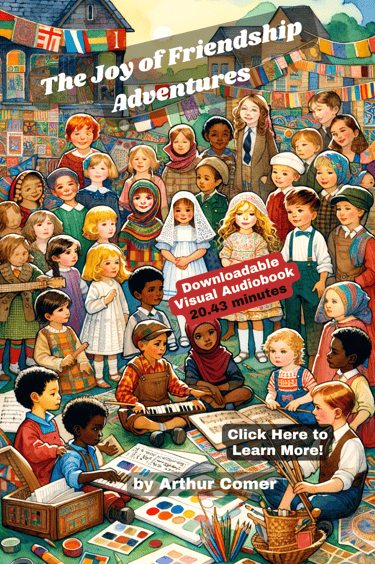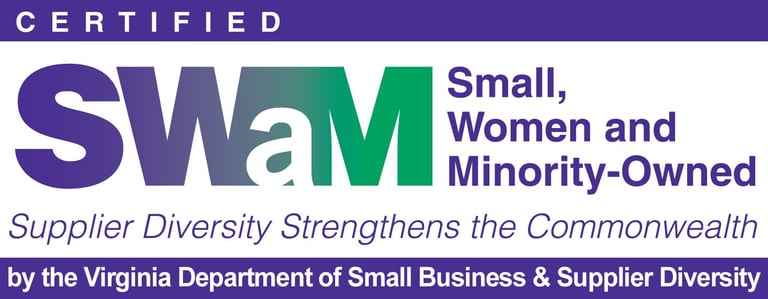Empowering Young Minds: The Impact of Diversity Education
In a world that is becoming increasingly diverse, it is crucial to equip the next generation with the tools to navigate and embrace this diversity. Through the lens of diversity education, we can nurture young minds to not only understand differences but also to celebrate them. Imagine a future where empathy, respect, and global citizenship are at the forefront of every child's education. This article explores the transformative impact of diversity education on shaping inclusive and open-minded individuals. From fostering empathy and understanding to promoting respect for differences, we will delve into the key components of diversity education that are shaping the minds of our future leaders. Join me on this journey to discover how we can empower young minds to create a more inclusive society for all.
UNLOCK THE POWER: TRANSFORMING MINDS AND HEARTS OF ALL AGES
Arthur Comer
3/18/20253 min read


Fostering Empathy and Understanding
One crucial aspect of diversity education is fostering empathy and understanding among our children, enabling them to see the world through different perspectives. This foundation of empathy sets the stage for promoting respect for differences, which is essential in creating a more inclusive society for all individuals.
Promoting Respect for Differences
Encouraging our children to embrace and celebrate the uniqueness of each individual is key to promoting respect for differences. By recognizing and valuing the diverse backgrounds, experiences, and beliefs of others, young minds can foster a culture of inclusivity and acceptance. This mindset helps create a safe and welcoming environment where everyone feels valued and respected for who they are. Through promoting respect for differences, we can empower students to become compassionate and open-minded individuals who can thrive in an increasingly diverse world.
Encouraging Global Citizenship
Encouraging Global Citizenship begins with recognizing the value of diverse perspectives and experiences. By expanding our children’s understanding of the world beyond their immediate surroundings, we can cultivate a sense of responsibility towards the global community. This mindset enables young minds to become active participants in creating a more inclusive and equitable society where everyone has a voice and a role to play in shaping the future. Promoting global citizenship not only enriches children’s educational experience but also prepares them to navigate an interconnected world with empathy and cultural competence. This holistic approach to education lays the foundation for creating inclusive learning environments that foster collaboration, understanding, and mutual respect among all members of the community.
Creating Inclusive Learning Environments
To cultivate inclusive learning environments, it is essential to create spaces where all students feel valued, respected, and supported in their journey. Parents and educators play a crucial role in fostering a sense of belonging by actively promoting diversity, inclusivity, and equity within our children’s environment. By incorporating diverse perspectives, experiences, and voices into the everyday life of our children, we can empower them to embrace their unique identities while celebrating the richness of cultural differences. These inclusive learning environments not only promote academic success but also nurture a sense of community where every individual feels heard and valued. Embracing cultural diversity is a vital component of creating inclusive learning environments that encourage mutual respect, empathy, and collaboration among people from all backgrounds.
Click here to embark on a colorful journey with 'The Joy of Friendship Adventures' by Arthur Comer, a visually captivating and heartwarming downloadable Visual Audiobook designed for children but applicable to adults. This engaging masterpiece, rich with vibrant illustrations, immerses young listeners in the delightful world of friendship over a charming runtime of 20 minutes and 43 seconds. Perfect for sparking imagination and fostering meaningful bonds, this visual audiobook is a must-have for every child's digital library.
Embracing Cultural Diversity
In embracing cultural diversity, parents and educators have the opportunity to expose children to a wide range of perspectives, beliefs, and traditions that can enrich their understanding of the world around them. By encouraging curiosity, empathy, and open-mindedness, parents and educators empower young minds to appreciate the value of inclusion and cooperation in a diverse society. This foundation of cultural diversity sets the stage for teaching children the importance of acceptance and understanding towards others, fostering a sense of unity and interconnectedness that transcends boundaries and differences.
Teaching Children the Value of Inclusion
Building upon the foundation of cultural diversity, parents and educators have a unique opportunity to teach children the value of inclusion. By fostering a sense of belonging and acceptance towards individuals from all backgrounds, we can help children recognize the beauty in diversity and the strength that comes from working together with others. Through inclusive education, children learn to appreciate the unique qualities and perspectives that each person brings to the table, creating a sense of unity and community within the classroom and beyond. Ultimately, teaching children the importance of inclusion sets them on a path toward becoming compassionate and empathetic individuals who are capable of building a more harmonious and interconnected society.
In conclusion, diversity education is the key to shaping a generation of empathetic, respectful, and globally minded individuals. By creating inclusive learning environments, embracing cultural diversity, and teaching the value of inclusion, we can empower young minds to build a more inclusive society. Let's take action today to support diversity education and pave the way for a brighter, more inclusive future for all. As Nelson Mandela once said, "Education is the most powerful weapon which you can use to change the world."


Jewelry of Distinction
I'd Love to Hear From You!
Email: arthur@alcjr.com
© 2026. All rights reserved.


ALCJR Enterprises
Affiliate Marketing Disclosure Statement
At ALCJR Enterprises, transparency and trust with my audience are paramount. By the Federal Trade Commission's guidelines, I want to ensure that you, my valued visitors, fully understand my relationship with the products and services I feature.
My Affiliate Relationships with Etsy, Amazon, Vevor, and Others
Some of the links on my website are affiliate links, which means that if you click on the link and make a purchase, I may receive a commission at no additional cost to you. These commissions help support my website and allow me to continue providing valuable content. Please note that my opinions are my own, and I only recommend products or services I truly believe will bring value to my audience.
Why I Use Affiliate Links
Support My Work: The commissions earned through affiliate links help me maintain the quality and integrity of my content.
No Additional Cost: The price you pay as a customer is not affected by my affiliate partnerships.
Commitment to Quality: I am committed to recommending products that I have either used myself or thoroughly researched.
My Promise to You
I am dedicated to maintaining the trust of my audience. That's why:
I will always disclose my affiliate relationships clearly and openly.
I will provide honest reviews and insights, regardless of any affiliate partnerships.
I will prioritize your interests and ensure that my content remains unbiased and reliable.
Thank you for supporting ALCJR Enterprises. Your trust means everything to me. If you have any questions about my affiliate relationships, please feel free to contact me at alcjr@verizon.net.
